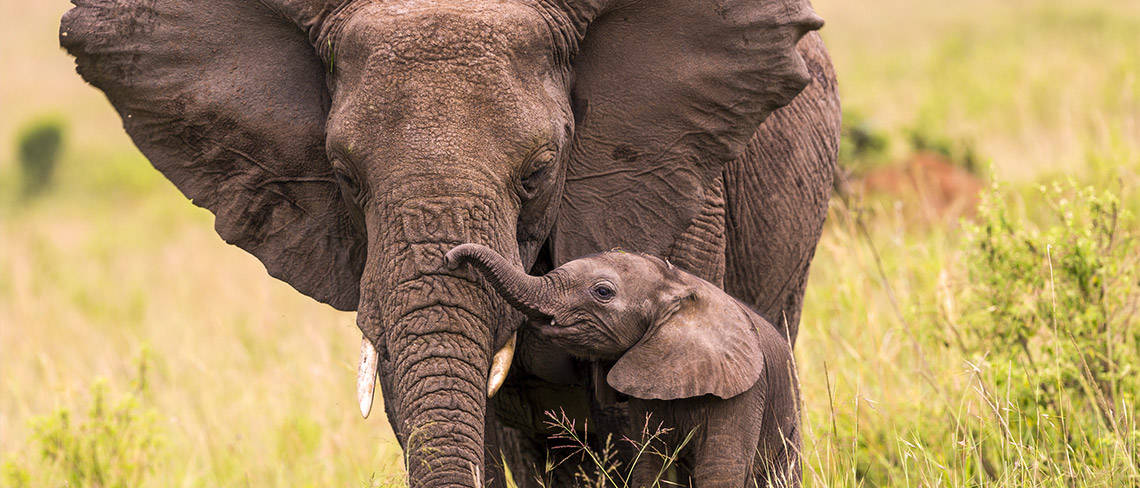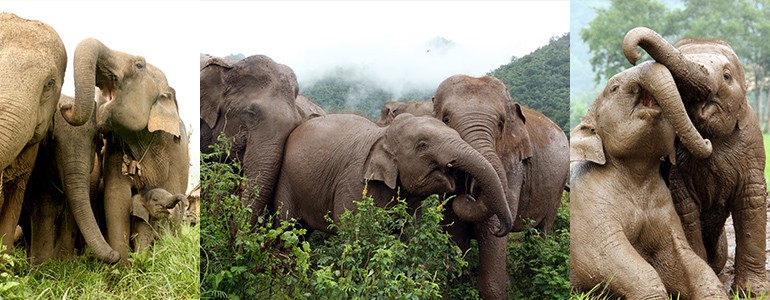
They’re the largest land mammals but how much do you know about these fascinating creatures? In celebration of World Elephant Day this Saturday (12 August) the meaningful travel experts at Rickshaw Travel have put together their top fun facts about elephants.
Rickshaw Travel is dedicated to animal welfare and provides responsible experiences to protect elephants. World Elephant Day is an international annual event dedicated to the preservation and protection of elephants.
Male elephants leave the herd between the ages of 12 and 15
Males prefer to live a bachelor lifestyle while females spend their entire lives in tight family groups made up of mothers, grandmothers, aunts, sisters and daughters. The eldest female normally leads the group.
The elephant is one of only a few mammals that can’t jump
Despite what you may have seen in cartoons, elephants can’t jump. And there’s one simple reason why: they don’t have to. Most animals jump to get away from predators but elephants keep themselves safe by relying on their size and sticking to their protective groups.
Elephants purr like cats as a means of communication
You’ve probably heard an elephant trumpet, but they also produce rumbles so low that humans can’t hear them. If you get anywhere near an elephant herd you may feel a physical buzzing, which is the elephants talking to one another.
Elephants’ eyes are small and their eyesight is poor
Elephants spend their days walking through forests, grass and water; however, they primarily navigate with their trunks rather than sight as their eyesight is poor.
The elephant’s trunk has 150,000 muscle units and can hold over two gallons of water at a time
Some may think that elephants drink through their trunks, but in fact they use them as “tools” to drink with by filling it with water and then using it as a hose to pour into their mouths.
They consume as much as 300-495 pounds of food per day
An African elephant can weigh as much as 16,500 pounds, making it the largest terrestrial animal. So, it’s no surprise that they need to eat a lot to keep their bodies moving. Wild elephants spend most of their time looking for food and they eat plants of all sizes as well as fruit, grass and bamboo.
There are only two distinct species of elephant left in the world: The African elephant and the Asian elephant.
Since removing elephant riding from their trips, Rickshaw Travel has teamed up with World Animal Protection to offer more ethical elephant experiences, including visiting an elephant park in Chiang Mai, a jeep safari, spotting wild elephants in Sri Lanka, and a trip to the Elephant Herds of Pranburi, Thailand. With most captive elephants in the tourism industry being captured illegally, Rickshaw has opted for more Meaningful encounters with elephants by providing enriching experiences where everybody (including elephants!) benefits. Elephants are an endangered species but there are still many destinations you can visit to see them responsibly.
The oldest known elephant in the world lived for 86 years. The average lifespan of an elephant is from 50 to 70 years.
The world’s oldest elephant was an Asian elephant called Lin Wang who died on 26 February 2003 at Taipei Zoo in Taiwan.
There are an estimated 15,000-20,000 captive elephants around the world, most of which live in harsh conditions.
Riding elephants is on some travellers’ wish lists but the truth is that cruel practices are used to tame these creatures – torture methods including confinement, chaining, forced starvation and beatings from a bullhook are used during infancy. This abuse happens behind the scenes so is often overlooked by tourists. Instead of riding an elephant, Rickshaw Travel is encouraging holidaymakers to opt for an experience that lets you view the animals in a hands-off way and lets them live a natural, happy life; visit the rescued residents of the Elephant Transit Home in Sri Lanka, spot herds in the wild on a walking safari in India and watch them roam as a herd at the Elephant Nature Park in Chiang Mai.
For further information on Rickshaw’s elephant experiences visit http://www.rickshawtravel.co.uk/elephants.
-Ends-
For further press information, please contact:
Melissa Hobson/Natalie Garland/James Brooke
Rooster PR
T: +44 (0)20 3440 8927
E: [email protected]
About Rickshaw Travel
Rickshaw Travel is an independent tour operator based in Brighton. They are committed to providing enriching, immersive travel experiences that take holidaymakers off the beaten path and into the heart of local communities.
Meaningful travel – or travelling in a way that everybody benefits from – is the core ethos of Rickshaw: the traveller benefits from enriching experiences where they learn something new (about the destination, culture, a skill or about themselves) and at the same time the local people, animals and/or environment benefit too.
Rickshaw Travel’s individual approach to independent exploration enables adventurous holidaymakers to visit the heart of a destination and experience the real spirit of a local culture. Rickshaw specialises in offering small-scale, authentic accommodation that truly reflects the character of each destination.
Rickshaw are proud to have built up a team of passionate Travel Specialists who each have extensive travel experience in their own dedicated destinations. They pride themselves on being open and honest about the places they have visited and are on hand to inspire and support travellers. The company’s style of travel is unique – Rickshaw’s dedicated Product Team has worked alongside the company’s in-destination partners to create a choice of carefully selected bite-size trips, typically 2-4 days long, which can be combined to create the perfect itinerary. Rickshaw’s bite-size trips include a range of local excursions, charming authentic accommodation and some transfers to ensure a hassle-free holiday.
Protecting nature and wildlife – and encouraging travellers to do the same – is also key for the Rickshaw team. The company has partnered with World Animal Protection to develop an Animal Welfare Policy, has committed to supporting the end of elephant riding by signing World Animal Protection’s elephant-friendly pledge, and is in the process of auditing trips involving any type of wild animal interaction.
Rickshaw Travel now offers trips in 25 destinations across Asia, Central and South America, and Africa, including Cuba, Vietnam, Myanmar, Thailand, India, Costa Rica, Peru, Borneo, Indonesia, Sri Lanka, Malaysia, Chile and Brazil and is launching Japan by September 2017. The company’s turnover and passengers carried increased by 50% from 2015 to 2017 and the company is aiming for a further 30% increase by 2019.
For more information, visit https://www.rickshawtravel.co.uk/, https://www.facebook.com/rickshawtravel/, https://twitter.com/Rickshaw_Travel or https://www.instagram.com/rickshaw_travel/ or call 01273 934 823.







